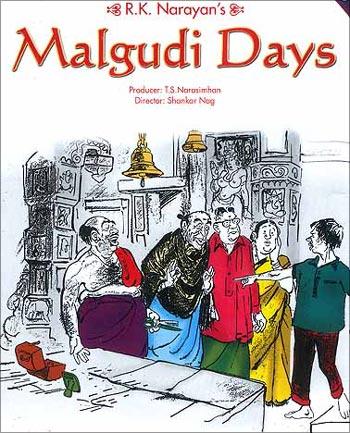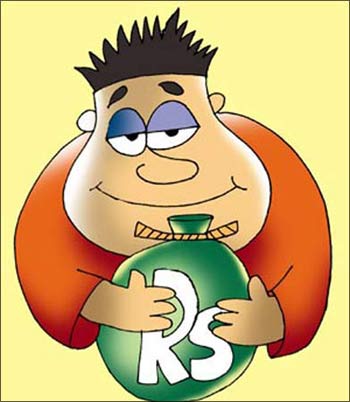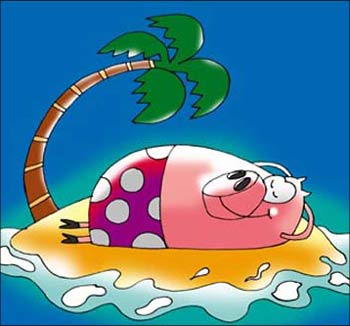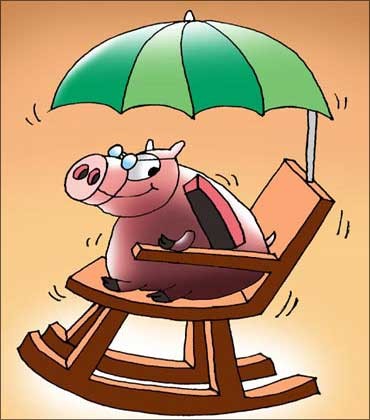S Gnanaharan
The Tata Consultancy Services-Smart Manager Case Contest is the oldest and most prestigious competition of its kind in India.
Apart from a one-year free subscription to The Smart Manager, India's first world-class management magazine, winners from the 'manager' and 'student' categories stand to win cash prises of Rs 25,000 each.
All you have to do is read the case, see the question you have to answer on the last slide, . . .
Case of the money doctor: Solve and win Rs 25,000!
Photographs: Uttam Ghosh/Rediff.com
The same would be true of Margayya -- the eponymous financial expert of one of the novels set in Malgudi -- offering solutions to rural people's financial problems.
To fully appreciate the character of Margayya, it may be a good idea to seek the help of Rudyard Kipling's Six Honest Serving Men: "What and Why and When And How and Where and Who."
Who?
Who is this guy, Margayya? R K Narayan introduces him like this: Everyone called him Margayya and thought that he had been called so at his naming ceremony.
He himself must have forgotten his original name: he had gradually got into the habit of signing his name 'Margayya' even in legal documents. And what did it mean? It was purely derivative: 'Marga' meant 'The Way', and 'Ayya' was an honorific suffix: taken together it denoted one who showed the way out to those in financial trouble.
. . .
Case of the money doctor: Solve and win Rs 25,000!
Photographs: Uttam Ghosh/Rediff.com
And in all those villages that lay within a hundred-mile radius of Malgudi, was there anyone who could honestly declare that he was not in financial difficulties?
Even today, in the absence of accessible banking services in most parts of rural India, only moneylenders perform this task, lending at usurious rates and keeping people in debt forever.
What?
Next in line is 'what he does' for a living and how it impacts the rural people. During one of his conversations with a group of clients, Margayya makes the following comment: "I just want to help people to get over their money troubles. I do it as a sort of service, but let no one imagine I have no better business."
Then again, when somebody asks him about his line of business, Margayya has the following to say: "Well Sort of banking It is not merely lending. It is not as cheap as that; I also try to help people about money whenever they are in difficulties."
. . .
Case of the money doctor: Solve and win Rs 25,000!
Photographs: Uttam Ghosh/Rediff.com
There was no stopping him on his pet subject: "Money is the greatest factor in life and the most ill-used. People don't know how to tend it, how to manure it, how to water it, how to make it grow, and when to pluck its flowers and when to pluck its fruits. What most people now do is to try and eat the plant itself "
In another situation R K Narayan talks about Margayya's concern about lack of financial literacy among students: "Margayya was upset that the students didn't have any knowledge of money and related issues. He pitied them. He felt that he must do something to enlighten their minds. He would not be a banker to them but a helper, a sort of money doctor who would help people to use their money properly with the respect due to it. He would educate society anew in all these matters."
Why?
There is a strong correlation between one's motivation for doing a certain activity and the quality of the outcome of that effort. So, it is important to understand Margayya's motive for being what he is and for what he does: "I want to do so much for you fellows, do you know why?"
They shook their heads bewildered. "Not because of the petty interest you give me -- that's nothing for me. It is because I want you all to get over your money worries and improve your lives. You must all adopt civilized ways. That's why I am trying to help you to get money from that bastard office." He points at the co-operative bank.
. . .
Case of the money doctor: Solve and win Rs 25,000!
Photographs: Uttam Ghosh/Rediff.com
From the book, it is clear that Margayya is unhappy with what he is doing not because he doesn't like the job but mainly because it was not generating the kind of income he aspired for: "I am tired of this tame business of lending to my rustic clients," Margayya said.
"I want to do something better for a change. It doesn't mean I'm giving up my village clients. I shall continue to serve them as a sort of duty to them but "
How?
The way Margayya does his business is simple but intelligent. He operates out of a small trunk which houses all the paraphernalia for carrying out his business: "[s]howiness was becoming the real curse of all businesses these days It was not necessary to have too many tables or leather-bound ledgers; all that was required was just one head and a small note book in which to note down all the figures if they become too complicated, and above all a scheme. "
To Margayya, banking was not just lending; it was much more than that. It was giving advice, providing solutions, and making people's lives hassle-free. In order to fulfill all these tasks, he kept abreast of current affairs, almost with a religious zeal: "He read with avidity what was happening in the world: the speeches of statesmen, the ravings of radicals, the programme for this and that, war news, and above all the stocks and shares market. He glanced through all this because a certain amount of world information seemed to be essential part of his equipment when he sat in his office."
. . .
Case of the money doctor: Solve and win Rs 25,000!
Photographs: Uttam Ghosh/Rediff.com
Where?
Margayya would sit under the banyan tree, dispensing advice to peasants, with only a small trunk that contained all the necessities for his work. Over time, his thinking changed.
He started looking for more lucrative prospects and located his office in a building with chairs and tables: "I must also look to your convenience, don't you see?" he asked his clients. And as he found an office, he lost sight of principled practice.
Soon, he earned the reputation of being a financial wizard, and Margayya's name began to be counted among the who's who of Malgudi. But the man who showed others the way had fallen off the path himself.
The rise and fall
The end of the riches, however, came as abruptly as the wealth itself. He loses everything except the family house and the box that was an integral part of his earlier life.
. . .
Case of the money doctor: Solve and win Rs 25,000!
Photographs: Uttam Ghosh/Rediff.com
This forces him to re-evaluate his business decisions, and he gains a newfound respect for his earlier business methods.
This is the advice he gives his son Balu: "You see that box there. I have managed to get it out again Its contents are intact as I left them years ago -- a pen and an ink bottle. You asked for my property. There it is, take it: have an early meal tomorrow and go to the banyan tree in front of the co-operative bank. I hope the tree is still there. Go there, that is all I can say: and anything may happen thereafter. Well, what do you say? I am showing a way. Will you follow it?"
The boy, looking crushed, stood ruminating: "How can I go and sit there? What will people think?"
Your turn!
And now, what do you think Balu should do? Is there sufficient scope for an individual entrepreneur to blossom in the rural financial sector today?
Click on the logo below to submit your analysis. Or you may want to mail your analysis to casestudy@thesmartmanager.com.
- Your solution and analysis shouldn't exceed 500 words.
- You will be judged on the analysis, clarity of thought, viability, completeness of the solution and language.
- We want plain text: no tables, charts, graphics or any other visuals.
- There is no entry fee for this contest.
- Keep a photo of yourself handy, in case you win.
- For more details, log on to www.thesmartmanager.com or email casestudy@thesmartmanager.com
- Selected to present common managerial dilemmas, the contest case studies are fictitious and have no relevance to any specific company.
-
(Note: Please check your email after registration for your username and password).
All right reserved with The Smart Manager








article